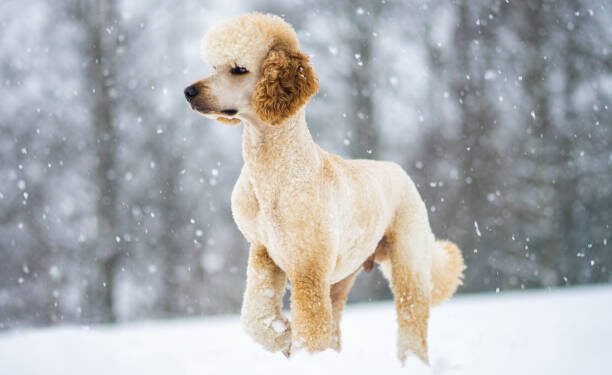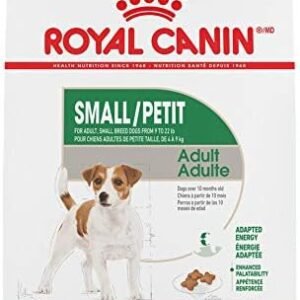When it comes to dog breeds that are both elegant and highly intelligent, the Poodle is undoubtedly at the top of the list. With their distinctive appearance and charming personalities, Poodles have captured the hearts of dog enthusiasts worldwide. In this comprehensive guide, we will delve into the world of Poodles, exploring their unique characteristics, care requirements, and much more. Whether you’re a seasoned Poodle owner or considering bringing one into your life, this guide aims to provide you with all the essential information you need.
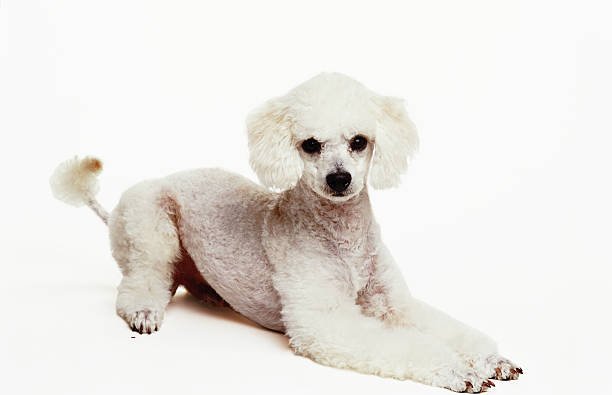
Introduction
Picture this: a dog that graced the courts of European royalty, a breed known for its impeccable grooming and elegance, and an intellect that rivals many other breeds. This remarkable dog is none other than the Poodle. But beyond its regal appearance lies a world of fascinating attributes that make it one of the most intriguing breeds in the canine kingdom.
In this guide, we aim to provide you with a comprehensive overview of the Poodle dog breed. We’ll cover everything from their physical characteristics, temperament, and intelligence to their grooming needs, exercise requirements, and more. Whether you’re a prospective Poodle owner or simply curious about these remarkable dogs, we’re here to satisfy your curiosity and provide you with valuable insights into the world of Poodles.
It’s important to note that there is already a wealth of information available about the Poodle breed. However, as the understanding of dog breeds evolves and new insights emerge, it’s crucial to have access to up-to-date and reliable sources of information. This guide seeks to be a current and comprehensive resource for all your Poodle-related queries.
Poodle Breed Information
To truly understand the Poodle breed, let’s start by examining some key characteristics. Below is a table summarizing various aspects of the Poodle, from their physical attributes to their behavioral traits.
| Field | Information |
|---|---|
| Height | Varies (Standard, Miniature, Toy) |
| Weight | Varies (Standard, Miniature, Toy) |
| Life Span | 10-18 years |
| Good with | Children, other dogs |
| Temperament | Intelligent, alert, active |
| Intelligence | Exceptional |
| Shedding Amount | Low |
| Grooming | High |
| Exercise Needs | Moderate to high |
| Energy Level | High |
| Barking Level | Low to moderate |
| Drool Amount | Minimal |
| Coat Length/Texture | Curly or wavy |
| Colors | Various (e.g., white, black) |
| Patterns | Solid colors, parti-colors, etc. |
Note: Poodles come in three main sizes – Standard, Miniature, and Toy. Each size category may have variations in height and weight.
This table provides a snapshot of what makes the Poodle breed unique. However, in the sections that follow, we will delve deeper into each of these aspects to offer you a comprehensive understanding of Poodles.
Table of Contents
Poodle’s Appearance and Size
Poodles are known for their elegant and graceful appearance. Their size can vary significantly depending on whether they are Standard, Miniature, or Toy Poodles. Standard Poodles are the largest, while Toy Poodles are the smallest.
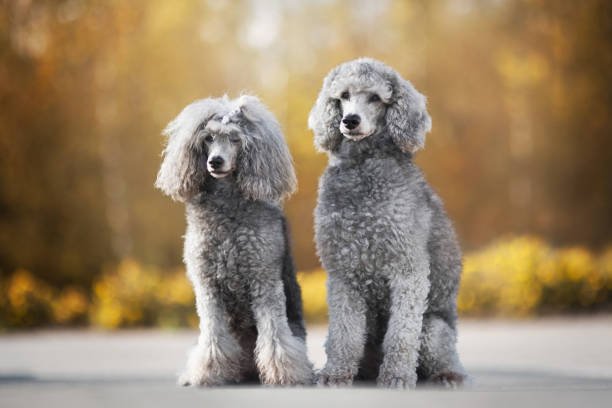
Standard Poodles
- Height: 15 inches and over at the shoulder
- Weight: 45 to 70 pounds
Miniature Poodles
- Height: 10 to 15 inches at the shoulder
- Weight: 15 to 17 pounds
Toy Poodles
- Height: Up to 10 inches at the shoulder
- Weight: 4 to 6 pounds
Poodle’s Temperament and Intelligence
Poodles are renowned for their intelligence and versatility. They are quick learners and excel in various canine activities, from obedience training to agility competitions. Their temperament is often described as alert, active, and highly trainable.
Poodle’s Coat and Grooming Needs
One of the most iconic features of Poodles is their curly or wavy coat, which is hypoallergenic and virtually non-shedding. However, this luxurious coat requires regular grooming to keep it in pristine condition. We will delve into the specifics of Poodle grooming in a later section.
Poodle’s Exercise Requirements
Poodles are energetic dogs that thrive on physical activity and mental stimulation. Regular exercise is essential to keep them happy and healthy. We’ll explore their exercise needs and activities they enjoy in detail.
Poodle’s Lifespan and Health
Understanding the Poodle’s lifespan and common health issues is crucial for responsible ownership. Poodles are known for their longevity, but they can be prone to certain health conditions. We’ll provide insights into their overall health and how to care for them throughout their lifespan.
In this comprehensive guide, we’ve just scratched the surface of what makes Poodles such remarkable companions. Stay tuned as we dive deeper into each aspect of Poodle ownership, ensuring that you have all the information you need to provide the best possible care for your furry friend.
2. Breed History and Origin
The history of the Poodle breed is as fascinating as the breed itself. In this section, we’ll embark on a journey through time to explore the origins and evolution of these remarkable dogs. Understanding their historical development sheds light on the unique traits and characteristics that define Poodles today.
Exploring Their Roots
The Poodle’s history can be traced back to centuries ago, and it’s a tale of adaptability and versatility. Here, we delve into the breeds that played a pivotal role in shaping the modern Poodle.
1. Water Dogs of Europe
The Poodle’s ancestors were water dogs found in Europe. These dogs were known for their aquatic prowess, making them excellent retrievers for waterfowl hunters. They were prized for their swimming abilities and were utilized by hunters to fetch waterfowl from lakes and rivers.
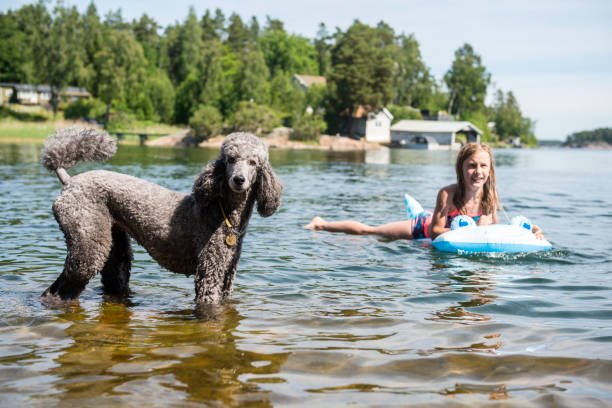
2. French Connection
The term “Poodle” itselfis derived from the German word “Pudel,” which means “to splash in the water.” However, it was in France that the Poodle as we know it today began to take shape. French breeders played a significant role in refining the breed’s appearance and characteristics.
3. Miniaturization in Germany
In Germany, the Poodle underwent a process of miniaturization. Breeders selectively bred smaller Poodles, which eventually led to the development of the Miniature and Toy Poodle varieties. These smaller Poodles were favored by European nobility as companion dogs and performers in circuses.
Notable Traits
The Poodle’s history is marked by several distinctive traits and features that have made it a beloved breed throughout the ages.
1. Intelligence
One of the standout traits of Poodles is their exceptional intelligence. This quality was vital in their role as water retrievers, where they needed to understand and execute complex commands swiftly. Even today, Poodles are ranked among the most intelligent dog breeds, making them highly trainable and adaptable companions.
2. Hypoallergenic Coat
Poodles are known for their curly or wavy coats, which are hypoallergenic and produce minimal shedding. This unique coat type has made them a popular choice for individuals with allergies to pet dander. It also requires regular grooming to maintain its health and appearance.

3. Versatility
Throughout their history, Poodles have displayed remarkable versatility. They have excelled in various roles, from water retrievers to circus performers. Today, they continue to showcase their adaptability by participating in dog sports, obedience trials, and as therapy dogs.
Relevance of Origin
Understanding the origin of the Poodle breed provides valuable insights into why these dogs possess the traits they do today.
1. Water-loving Heritage
The Poodle’s ancestral connection to water dogs is still evident in their love for water-related activities. Many Poodles today relish swimming and playing in the water, which harks back to their days as skilled retrievers in waterfowl hunting.
2. Exceptional Trainability
The breed’s history as a working dog that needed to respond swiftly to commands has left an indelible mark on their intelligence and trainability. Poodles are quick learners and excel in obedience training, agility, and other canine sports.
3. Diverse Size Variations
The development of Miniature and Toy Poodles in Germany demonstrates how breeders adapted the breed to various sizes to meet different needs. This diversity allows individuals to choose a Poodle that fits their lifestyle and living space.
In conclusion, the Poodle’s rich history is a testament to the breed’s adaptability, intelligence, and versatility. From their roots as water dogs to their role in European nobility and modern-day companionship, Poodles have left an indelible mark on the world of dogs. In the next section, we will explore the various Poodle sizes in detail, allowing you to choose the perfect fit for your home and lifestyle.
3. Understanding the Poodle Breed’s Traits
Now that we’ve explored the history and origin of the Poodle breed, it’s time to dive deeper into their distinctive traits. In this section, we’ll examine the physical characteristics, temperament, environmental needs, training, and socialization aspects of Poodles.
Physical Characteristics
Poodles are known for their unique and elegant appearance. Understanding their physical attributes is essential for anyone considering adding a Poodle to their family.
Size and Variations
Poodles come in three main size categories, each with its own set of characteristics:
- Standard Poodle
- Height: 15 inches and over at the shoulder
- Weight: 45 to 70 pounds
- Miniature Poodle
- Height: 10 to 15 inches at the shoulder
- Weight: 15 to 17 pounds
- Toy Poodle
- Height: Up to 10 inches at the shoulder
- Weight: 4 to 6 pounds
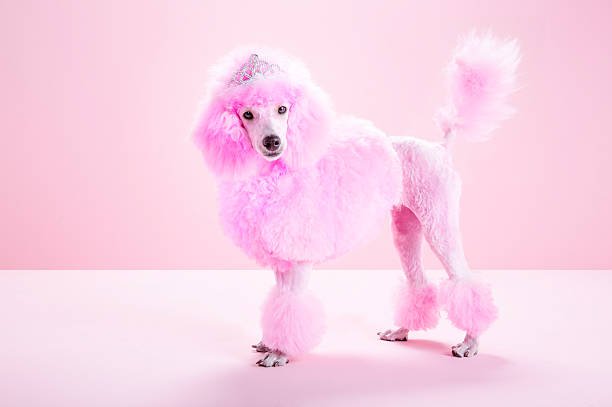
Coat Type and Color
Poodles are easily recognizable by their curly or wavy coat, which is also hypoallergenic. The coat can come in various colors, including white, black, apricot, cream, and more. It’s important to note that Poodles can have solid colors or parti-colors, with a combination of two or more colors.
Distinguishing Features
One of the most distinctive features of Poodles is their elegant, long neck and head carriage. Their eyes are dark and expressive, and they have a well-proportioned body with a straight back and a distinctive curly tail. Their overall appearance exudes grace and sophistication.
Temperament Overview
Poodles are not just beautiful on the outside; their temperament makes them equally charming on the inside. Here, we’ll explore what makes Poodles exceptional companions.

Intelligence and Trainability
Poodles are often hailed as one of the most intelligent dog breeds. Their ability to learn and respond to commands is remarkable. This intelligence makes them highly trainable and eager to please, which is a boon for dog owners looking for a responsive and obedient pet.
Temperament with Children
Poodles are generally known to be great with children. Their gentle and playful nature makes them wonderful family pets. However, as with any dog breed, it’s essential to supervise interactions between Poodles and young children to ensure a positive and safe environment for both.
Compatibility with Other Pets
Poodles can coexist harmoniously with other pets, including dogs and cats, provided they are properly socialized from a young age. Early exposure to other animals helps them develop positive relationships and reduces the likelihood of aggressive behavior.
Environmental Needs
Understanding the environmental needs of the Poodle breed is crucial to ensure they settle well into your home environment.
Space Requirements
Poodles are adaptable when it comes to living spaces. While Standard Poodles may appreciate a larger living area, Miniature and Toy Poodles are well-suited for apartment living, provided they receive regular exercise and mental stimulation.
Temperature Sensitivity
Poodles are generally comfortable in a range of temperatures, but they may require protection in extreme conditions. Keep in mind that their curly coat provides insulation in cold weather but can also make them susceptible to overheating in hot weather. Adequate shade and hydration are essential during warm seasons.
Training and Socialization
Proper training and socialization are key factors in ensuring your Poodle becomes a well-rounded and well-behaved companion.
Trainability
As mentioned earlier, Poodles are highly trainable due to their intelligence and eagerness to please. Consistent and positive reinforcement-based training methods work best with this breed. Enrolling in obedience classes or working with a professional trainer can help you harness their full potential.
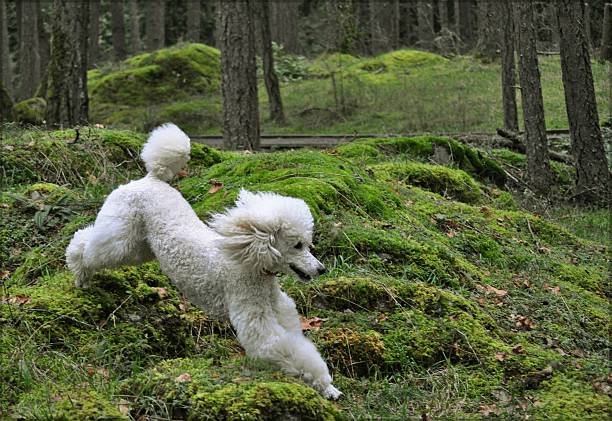
Socialization
Early socialization is crucial for Poodles to develop positive interactions with people and other animals. Exposing them to various environments, people, and situations during their formative months can help prevent fearfulness or aggression later in life.
In summary, Poodles are not only known for their elegant appearance but also for their intelligence, adaptability, and friendly temperament. They make wonderful family pets, provided they receive proper training, socialization, and care. Understanding their physical and behavioral traits is the first step in providing a loving and nurturing home for your Poodle companion. In the next section, we’ll explore the essential aspects of grooming and maintenance to keep your Poodle looking and feeling their best.
4. Health Considerations and Care
Ensuring the well-being of your Poodle is paramount. In this section, we’ll delve into the various aspects of health and care, from common health issues to dietary needs, exercise requirements, grooming practices, and promoting a long and healthy life.
Common Health Issues
Poodles are generally a healthy breed, but like all dogs, they can be prone to certain health problems. Understanding these issues is crucial for early detection and proactive care.
1. Hip Dysplasia
Hip dysplasia is a genetic condition where the hip joint doesn’t develop properly. It can lead to arthritis and lameness. Regular veterinary check-ups can help monitor and manage this condition.
2. Progressive Retinal Atrophy (PRA)
PRA is an inherited eye disorder that can lead to blindness. Responsible breeders screen for this condition, but it’s important to schedule regular eye exams for your Poodle to catch any signs early.
3. Gastric Dilatation-Volvulus (GDV)
GDV, also known as bloat, is a life-threatening condition that can affect deep-chested breeds like Standard Poodles. Feeding smaller meals, avoiding exercise immediately after meals, and knowing the signs of bloat are essential.
4. Epilepsy
Some Poodles may develop epilepsy, which can cause seizures. Medication can help manage this condition, but it requires ongoing veterinary care.
5. Hypothyroidism
Hypothyroidism occurs when the thyroid gland doesn’t produce enough hormones. This can lead to weight gain, lethargy, and skin issues. Regular blood tests can diagnose and manage this condition.
6. Allergies
Poodles can be prone to allergies, which can manifest as skin irritation, itching, and ear infections. Identifying and managing allergens in their environment or diet is key.
Lifespan and Longevity
Poodles are known for their longevity. With proper care, they can live a long and healthy life.
Average Lifespan
The average lifespan of a Poodle is around 10 to 18 years, with Toy Poodles often living longer than Standard Poodles. Genetics, diet, and overall care play significant roles in determining their lifespan.
Tips for Promoting Longevity
- Regular Veterinary Check-ups: Annual check-ups with your veterinarian are essential for early disease detection and preventive care.
- Balanced Diet: Feed your Poodle a high-quality, well-balanced diet appropriate for their age and size. Avoid overfeeding, as obesity can lead to health problems.
- Exercise and Mental Stimulation: Provide regular exercise and mental enrichment to keep your Poodle physically and mentally healthy.
- Dental Care: Dental health is crucial. Brush your Poodle’s teeth regularly and provide dental chews or toys.
- Grooming: Proper grooming not only keeps them looking their best but also prevents skin issues related to matting.
Diet and Nutrition
A nutritious diet is the foundation of good health for your Poodle.
Dietary Needs
Poodles require a balanced diet that includes high-quality protein, healthy fats, and essential vitamins and minerals. Consult your veterinarian for dietary recommendations based on your Poodle’s age, size, and activity level.
Portion Control
Maintaining a healthy weight is vital for Poodles. Avoid overfeeding, and use portion control to prevent obesity. Dividing their daily food into two or three meals can help regulate their metabolism.
Feeding Schedule
Establish a regular feeding schedule and stick to it. Consistency in meal times helps with digestion and prevents grazing, which can lead to weight gain.
Read more about : Dietary needs of poodle dog breed
Exercise and Activity
Poodles are active dogs that thrive on exercise and mental stimulation.
Daily Exercise
Poodles benefit from daily exercise, which can include walks, playtime, and interactive toys. Aim for at least 30 minutes to an hour of physical activity each day, depending on their size and age.
Mental Stimulation
Their intelligence requires mental challenges. Puzzle toys, obedience training, and interactive games can keep their minds sharp and prevent boredom.
Grooming and Maintenance
Proper grooming is essential for Poodles to maintain their distinctive coat and overall health.
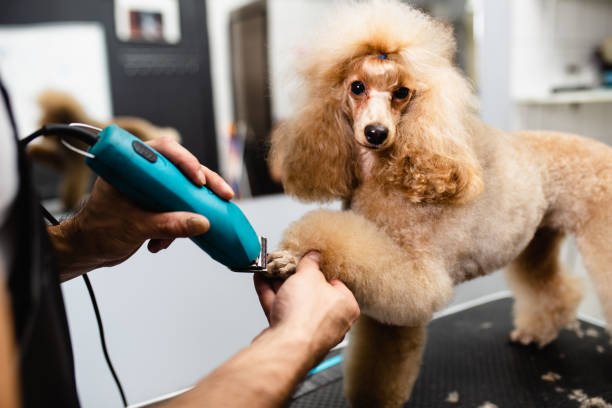
Coat Care
Poodles have a curly or wavy coat that requires regular brushing and professional grooming every 4 to 6 weeks. This prevents matting and maintains their coat’s health.
Ear and Eye Cleaning
Regularly clean your Poodle’s ears to prevent infections. Gently wipe the eyes to remove tear stains and prevent buildup.
Dental Care
Dental health is crucial for all breeds. Brush your Poodle’s teeth regularly and provide dental treats or toys to help reduce plaque and tartar buildup.
Shedding
Poodles are known for their minimal shedding, which makes them a great choice for allergy sufferers. However, regular grooming is necessary to prevent matting and maintain a healthy coat.
In conclusion, caring for a Poodle involves a combination of preventive health measures, proper nutrition, regular exercise, and grooming. By understanding their unique health considerations and providing them with the care they need, you can ensure that your Poodle enjoys a long, happy, and healthy life as a cherished member of your family.
5. Choosing and Adopting a Poodle Dog Breed
Adopting a Poodle can be a rewarding experience, but it’s essential to approach it with careful consideration and preparation. In this section, we’ll explore the reasons for adoption, how to research and prepare for adoption, the adoption process, and ethical considerations regarding breeding.
Reasons for Adoption
Adopting a Poodle, whether it’s a Standard, Miniature, or Toy Poodle, has several benefits, both for you and the dog in need of a home.
1. Giving a Second Chance
One of the most significant advantages of adopting a Poodle is the opportunity to provide a loving home to a dog in need. Many Poodles end up in shelters or rescue organizations due to various reasons, including changes in their owners’ circumstances. By adopting, you give them a second chance at a happy and fulfilling life.
2. Known Personality
Rescue Poodles often come with known personality traits and behavioral characteristics. This information can help you choose a dog that aligns with your lifestyle and preferences, reducing the uncertainty that can come with adopting a puppy.
3. Health Benefits
Many rescue organizations ensure that the dogs they place are spayed/neutered, vaccinated, and sometimes even microchipped. This can save you on initial veterinary costs.
4. Companionship
Poodles are known for their loyalty and affectionate nature. By adopting one, you gain a devoted companion who will bring joy and love into your life.
Research and Preparation
Before adopting a Poodle, thorough research and preparation are essential to ensure a successful and harmonious adoption.
Understanding Poodle Breed-Specific Needs
Poodles have unique needs and characteristics that you should be aware of, such as:
- Grooming: Poodles require regular grooming to maintain their coat.
- Exercise: They are active dogs and need daily exercise and mental stimulation.
- Training: Poodles are intelligent and thrive with positive reinforcement-based training.
Financial Responsibilities
Owning a dog comes with financial responsibilities, including:
- Initial Costs: Adoption fees, vaccinations, spaying/neutering, and microchipping.
- Ongoing Costs: Food, grooming, regular veterinary care, and unexpected medical expenses.
Preparing Your Home
Ensure your home is safe and suitable for a Poodle:
- Secure Fencing: If you have a yard, make sure it’s securely fenced to prevent escape.
- Puppy-Proofing: If adopting a puppy, puppy-proof your home by removing hazards.
- Supplies: Purchase necessary supplies, including food, bowls, a leash, collar, and toys.
Adoption Process
Adopting a Poodle involves a series of steps, and it’s crucial to choose a reputable rescue organization or breeder.
1. Research Rescues and Organizations
Start by researching rescue organizations or breed-specific groups that specialize in Poodles. Look for reviews, testimonials, and their commitment to animal welfare.
2. Complete an Application
Most rescues require you to complete an adoption application. This helps them assess your suitability as a pet owner and match you with a suitable Poodle.
3. Home Visit
Some organizations may conduct a home visit to ensure your living environment is suitable for a dog. This step is to ensure the safety and well-being of the dog.
4. Adoption Fee
Be prepared to pay an adoption fee, which typically covers vaccinations, spaying/neutering, and other initial medical costs.
5. Transition and Adjustment
Once you’ve adopted your Poodle, be patient during the adjustment period. It may take time for your new pet to settle into their new home and routine.
Breeding and Ethical Considerations
If you decide to explore breeders rather than adoption, it’s essential to prioritize ethical practices.
Responsible Breeding Practices
Choose a breeder who follows responsible breeding practices, which include:
- Health Screening: Reputable breeders screen their breeding dogs for hereditary health issues to ensure healthier puppies.
- Genetic Diversity: Responsible breeders prioritize genetic diversity to reduce the risk of inherited health problems.
- Socialization: Puppies should be well-socialized from a young age to adapt well to different environments and people.
- Lifetime Commitment: Ethical breeders are committed to the well-being of their dogs throughout their lives and offer support to puppy buyers.
Avoiding Puppy Mills
Steer clear of puppy mills, where dogs are often bred in inhumane conditions. Always visit the breeder’s facility in person to assess the living conditions of the dogs and meet the puppy’s parents.
In conclusion, choosing and adopting a Poodle is a significant decision that requires thoughtful consideration and preparation. Whether you opt for adoption or choose a breeder, prioritize the well-being of the dog and ensure that you can meet their unique needs. By making an informed choice and providing a loving home, you can look forward to years of companionship and joy with your Poodle.
6. Popularity and Recognition
Understanding the popularity and recognition of the Poodle breed is essential for anyone considering bringing one of these intelligent and elegant dogs into their life. In this section, we will explore the current popularity of Poodles, their recognition by kennel clubs and breed organizations, and notable breed varieties.
Current Popularity
Poodles have maintained their popularity for many years, thanks to their distinctive appearance, intelligence, and friendly nature. Their popularity endures for several reasons:
1. Hypoallergenic Coat
Poodles’ hypoallergenic coat makes them a top choice for individuals with allergies to pet dander. This characteristic has contributed to their enduring appeal.
2. Versatility
Poodles are incredibly versatile dogs. They excel in various roles, from family pets and therapy dogs to working as service animals and excelling in dog sports and competitions. Their adaptability appeals to a wide range of dog owners.
3. Intelligence
As one of the most intelligent dog breeds, Poodles are highly trainable. This quality attracts people who seek dogs that can quickly learn commands and perform tasks.
4. Celebrity Endorsement
Poodles have also received the endorsement of celebrities and public figures, further boosting their popularity. Well-known individuals often showcase their Poodles on social media and in the media, helping to make the breed more visible.
5. Social Media Presence
The rise of social media has allowed Poodle owners to share their dogs’ charm and personality with a global audience. Many Poodle-focused accounts and groups on platforms like Instagram and Facebook have gained substantial followings, celebrating the breed’s unique qualities.
Breed Recognition
Poodles enjoy widespread recognition from kennel clubs and breed organizations around the world.
American Kennel Club (AKC)
The American Kennel Club, one of the most prominent canine organizations in the United States, recognizes the Poodle breed. The AKC sets breed standards and promotes responsible ownership and breeding practices. The Poodle is classified into three size categories: Standard, Miniature, and Toy.
The Kennel Club (UK)
In the United Kingdom, The Kennel Club is the authoritative body responsible for breed standards and recognition. Poodles are recognized and categorized similarly to the AKC, with Standard, Miniature, and Toy Poodles.
Fédération Cynologique Internationale (FCI)
The Fédération Cynologique Internationale, an international canine organization, also recognizes the Poodle breed. The FCI sets standards that are followed by kennel clubs in various countries, ensuring consistency in breed recognition worldwide.
Notable Breed Varieties
Poodles come in three main size categories, each with its own unique characteristics:
1. Standard Poodle
Size:
- Height: 15 inches and over at the shoulder
- Weight: 45 to 70 pounds
Traits:
- Elegance and grace
- Intelligent and trainable
- Excellent swimmers
2. Miniature Poodle
Size:
- Height: 10 to 15 inches at the shoulder
- Weight: 15 to 17 pounds
Traits:
- Compact size
- Energetic and playful
- Well-suited for apartment living
3. Toy Poodle
Size:
- Height: Up to 10 inches at the shoulder
- Weight: 4 to 6 pounds
Traits:
- Tiny and delicate appearance
- Affectionate and loyal
- Ideal for individuals or families in small living spaces
Varieties within Varieties
Beyond the standard size categories, there are also variations in coat color and pattern. Poodles can come in a wide range of coat colors, including white, black, brown, apricot, cream, and more. Some may have solid colors, while others exhibit parti-color patterns, which are combinations of two or more colors.
In recent years, there has also been growing interest in “Designer Poodles.” These are Poodles that have been intentionally bred with other breeds to create unique hybrids with desirable traits. For example, the Labradoodle is a cross between a Labrador Retriever and a Poodle, known for its friendly and hypoallergenic qualities.
In conclusion, Poodles continue to enjoy popularity and recognition worldwide for their unique qualities, including their hypoallergenic coat, intelligence, and adaptability. Whether you choose a Standard, Miniature, or Toy Poodle, you’ll be joining a community of devoted Poodle enthusiasts who appreciate the breed’s charm and versatility. Additionally, the recognition of Poodles by prestigious kennel clubs and breed organizations ensures that breed standards are maintained and responsible breeding practices are promoted, further enhancing the breed’s reputation and quality.
7. Exercise and Activity Recommendations
Ensuring your Poodle gets the right amount and type of exercise is essential for their physical and mental well-being. Poodles are active and intelligent dogs, and providing them with regular exercise and mental stimulation is key to a happy and healthy life.
Exercise Plan
Here’s a comprehensive exercise plan for Poodles, taking into consideration their size and activity level. Remember that individual needs may vary, so it’s essential to adapt the plan to your Poodle’s specific requirements.
Types of Exercise
- Playtime: Engage in interactive play sessions with toys like fetch, tug-of-war, and hide-and-seek. Poodles enjoy games that challenge their intelligence and agility.
- Walks: Daily walks are essential for Poodles. Aim for at least 30 minutes to an hour of brisk walking. Larger Standard Poodles may benefit from longer walks.
- Agility Training: Poodles excel in agility training. Set up obstacle courses or enroll them in agility classes to keep them mentally and physically active.
- Swimming: If you have access to a pool or a safe water body, consider swimming sessions. Poodles have a natural affinity for water, and swimming is excellent exercise.
- Obedience Training: Incorporate training sessions into your daily routine. Poodles enjoy mental challenges, and obedience training is a great way to stimulate their minds.
Duration and Frequency
- Playtime: 20-30 minutes of playtime sessions throughout the day.
- Walks: Daily walks of 30 minutes to an hour, depending on your Poodle’s size and energy level.
- Agility Training: 1-2 sessions per week, each lasting 20-30 minutes.
- Swimming: Once or twice a week, if possible.
- Obedience Training: Short 10-15 minute sessions several times a week.
Breed-Specific Exercise Needs
Poodles have a few breed-specific exercise needs to keep in mind:
1. Swimming
Many Poodles have a natural love for water, stemming from their history as water retrievers. If you have access to a pool or a safe water body, allow your Poodle to swim regularly. Swimming provides an excellent full-body workout and is gentle on the joints.
2. Mental Stimulation
Poodles are highly intelligent dogs and require mental stimulation as much as physical exercise. Incorporate puzzle toys, treat-dispensing toys, and obedience training to challenge their minds.
3. Prevent Overexertion
While Poodles are active dogs, it’s important not to overexert them, especially during hot weather. Watch for signs of fatigue, such as excessive panting or reluctance to continue exercise.
Nutrition and Feeding Guidelines
Proper nutrition is fundamental to your Poodle’s health and well-being. Here are specific dietary recommendations based on your Poodle’s size, age, and activity level.
Dietary Considerations
1. Size-Specific Needs
Standard Poodle:
- Standard Poodles require a balanced diet designed for their size and activity level.
- Feed high-quality commercial dog food suitable for large breeds.
Miniature Poodle:
- Miniature Poodles need a diet formulated for small to medium-sized dogs.
- Choose dog food that meets the nutritional requirements for their size.
Toy Poodle:
- Toy Poodles are tiny and have unique dietary needs.
- Opt for specially formulated dog food for toy breeds.
2. Age Matters
Puppy: Poodle puppies require a diet that supports their growth and development. Feed puppy food with the appropriate balance of nutrients. Follow the feeding guidelines on the food packaging and consult your veterinarian for specific recommendations.
Adult: Adult Poodles need a well-balanced diet suitable for their size and activity level. Be mindful of portion control to prevent obesity.
Senior: Senior Poodles may benefit from senior dog food formulated to address their changing nutritional needs. Consult your veterinarian for guidance.
Feeding Schedules and Portion Control
Establishing a consistent feeding schedule and practicing portion control is crucial to maintaining a healthy weight for your Poodle.
Feeding Schedule
- Puppies: Feed puppies 3-4 times a day, gradually reducing to 2-3 times a day as they grow.
- Adults: Most adult Poodles do well with two meals a day, one in the morning and one in the evening.
- Seniors: Senior Poodles may continue with two meals a day or transition to three smaller meals if they have trouble digesting larger portions.
Portion Control
Portion control is essential to prevent overfeeding and obesity. Follow the recommended feeding guidelines on the dog food packaging, but also consider your Poodle’s age, size, and activity level. Adjust portion sizes accordingly, and consult your veterinarian if you’re unsure about the right amount to feed.
Special Dietary Considerations
Poodles are generally healthy dogs, but they can be prone to allergies, particularly skin allergies. Keep an eye out for any signs of food allergies, such as itching, ear infections, or gastrointestinal issues. If you suspect food allergies, consult your veterinarian to determine the best diet for your Poodle.
In conclusion, providing your Poodle with the right exercise and nutrition is crucial for their overall health and happiness. Regular exercise tailored to their size and energy level, along with mental stimulation, will keep them physically fit and mentally sharp. Feeding them a balanced diet appropriate for their age and size, while practicing portion control, will help maintain a healthy weight and prevent obesity-related health issues. Always consult your veterinarian for personalized exercise and dietary recommendations to ensure your Poodle’s specific needs are met.
8. Socialization and Training Tips
Socialization and training are essential aspects of raising a well-behaved and well-adjusted Poodle. In this section, we’ll provide breed-specific training tips, taking into account their temperament and intelligence. We’ll also offer advice on how to socialize your Poodle with other dogs and people.

Breed-Specific Training Tips
Poodles are renowned for their intelligence and trainability, but they can also be a bit independent. Here are some breed-specific training tips to help you effectively train your Poodle:
1. Positive Reinforcement
Poodles respond best to positive reinforcement training methods. Use treats, praise, and rewards to motivate them. Be patient and consistent in your training sessions.
2. Mental Stimulation
Poodles thrive on mental stimulation. Incorporate puzzle toys and interactive games into their routine to challenge their minds. Obedience training is an excellent way to engage their intellect.
3. Consistency
Consistency is key when training a Poodle. Establish clear rules and boundaries, and ensure that everyone in your household follows them. This consistency helps prevent confusion for your Poodle.
4. Socialization
Start socializing your Poodle from an early age. Expose them to various people, dogs, and environments. This helps them become well-adjusted and confident adults.
5. Obedience Training
Enroll your Poodle in obedience classes or conduct regular training sessions at home. Focus on basic commands like sit, stay, come, and heel. Poodles enjoy the mental challenge of learning new commands.
6. Be Gentle
Poodles are sensitive dogs and respond best to gentle training methods. Avoid harsh discipline, as it can lead to fear or anxiety. Instead, use positive reinforcement to encourage good behavior.
7. Socialization with Other Dogs
Poodles are generally friendly with other dogs. Arrange playdates with other dogs to help your Poodle develop good social skills. Supervise these interactions to ensure they are positive and safe.
Socialization Tips
Proper socialization is crucial for Poodles to grow into well-adjusted and confident dogs. Here are some tips for socializing your Poodle with other dogs and people:
1. Early Start
Begin socialization as early as possible. Puppies are more receptive to new experiences and people during their early developmental stages.
2. Puppy Classes
Consider enrolling your Poodle in puppy socialization classes. These classes provide a controlled environment for puppies to interact with other dogs and people.
3. Gradual Exposure
Introduce your Poodle to new experiences and people gradually. Start with calm and friendly dogs and people before gradually exposing them to more challenging situations.
4. Positive Experiences
Ensure that every socialization experience is positive for your Poodle. Use treats and praise to reward calm and friendly behavior.
5. Supervision
Always supervise your Poodle during socialization experiences. This allows you to intervene if any issues arise and ensures your Poodle’s safety.
6. Expose to Different Environments
Take your Poodle to various environments, such as parks, streets, and crowded places. Exposing them to different situations helps build their confidence.
7. Consistency
Regular and consistent socialization is essential. Make it a part of your Poodle’s routine to ensure they remain well-socialized throughout their life.
9. Common Behavioral Traits
Understanding the common behavioral traits of Poodles can help you better manage and address their specific needs and challenges. Poodles have a range of both positive and challenging behaviors associated with their breed.
Positive Behavioral Traits
1. Intelligence
Poodles are incredibly intelligent dogs. They learn quickly and are known for their problem-solving abilities. This intelligence makes them highly trainable and adaptable.
2. Playfulness
Poodles are playful and have a youthful spirit, even as adults. They enjoy interactive games and playtime with their owners, making them excellent family dogs.
3. Alertness
Poodles are naturally alert and make excellent watchdogs. They will alert you to any potential intruders or unusual activity around your home.
4. Affection
Poodles are affectionate dogs that form strong bonds with their families. They thrive on human companionship and enjoy being part of family activities.
5. Hypoallergenic Coat
Their hypoallergenic coat makes them an excellent choice for individuals with allergies. Poodle hair doesn’t shed as much as other breeds, reducing allergens in the home.
Challenging Behavioral Traits
1. Independence
While Poodles are intelligent and trainable, they can also be a bit independent. They may sometimes test boundaries or decide to do things their way.
2. Barking
Poodles can be prone to excessive barking if not properly trained. They are alert dogs, so they may bark at perceived threats or when they’re bored.
3. Separation Anxiety
Poodles can form strong attachments to their owners, which can lead to separation anxiety. They may become anxious when left alone for extended periods. Proper training and gradual desensitization to being alone can help address this issue.
4. Grooming Needs
Poodles have a high-maintenance coat that requires regular grooming. If not properly cared for, their coat can become matted and cause discomfort.
5. Energy Levels
Poodles have high energy levels and need regular exercise and mental stimulation. Without adequate activity, they may become restless or exhibit destructive behavior.
Managing and Addressing Behavioral Issues
To manage and address any behavioral issues in your Poodle, consider the following tips:
1. Consistent Training
Consistency is crucial when training a Poodle. Set clear boundaries, and use positive reinforcement methods to encourage desired behavior.
2. Mental Stimulation
Provide mental stimulation through puzzle toys, obedience training, and interactive games to prevent boredom and reduce undesirable behaviors.
3. Socialization
Continue socializing your Poodle throughout their life to ensure they remain well-adjusted and comfortable in various situations.
4. Grooming Care
Regularly groom your Poodle to prevent matting and discomfort. If you’re not comfortable with grooming, consider professional grooming services.
5. Exercise Routine
Stick to a consistent exercise routine to burn off excess energy and keep your Poodle physically and mentally fit.
6. Address Separation Anxiety
If your Poodle exhibits signs of separation anxiety, consult with a professional dog trainer or behaviorist for guidance on desensitization and counterconditioning techniques.
In conclusion, Poodles are intelligent and playful dogs with a few breed-specific behavioral traits to keep in mind. Proper training, socialization, and care can help you manage and address any challenges while enjoying the many positive aspects of owning a Poodle. Remember that each dog is unique, and understanding your Poodle’s individual personality will help you tailor your approach to their specific needs.
10. Personal Stories and Testimonials
There’s no better way to gain insight into the world of Poodles than through the real-life stories and testimonials of their owners. In this section, we’ll share personal anecdotes and experiences from Poodle owners, shedding light on the costs of owning this breed, including expenses related to grooming and care. We’ll also explore the pros and cons of having a Poodle as a pet, offering a well-rounded perspective.
Real-Life Stories from Poodle Owners
Story 1: The Joy of a Lifelong Companion
“I’ve had my Standard Poodle, Max, for over a decade now, and I can’t imagine life without him. The initial cost of bringing Max home was an investment, but it’s been more than worth it. Poodles are incredibly loyal and affectionate. Max has been my constant companion through thick and thin, always there with a wagging tail and a smile. Sure, grooming him can be a bit pricey, but the bond we share is priceless.” – Sarah, Poodle Owner
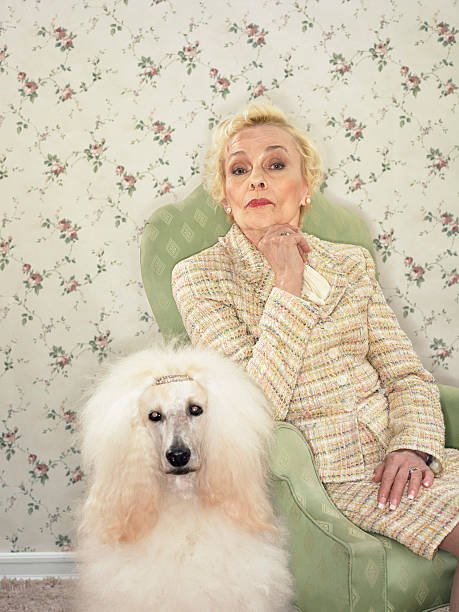
Story 2: A Toy Poodle’s Big Heart
“My family and I decided to bring home a Toy Poodle named Bella. She’s tiny, but her heart is enormous. Bella’s size makes her a perfect fit for our apartment, and she’s excellent with our kids. The grooming can be a bit of work, but Bella’s charming personality more than makes up for it. She’s a bundle of energy and joy, and we’re so grateful to have her in our lives.” – David, Poodle Owner

Story 3: The Enthusiastic Miniature Poodle
“As a first-time dog owner, I was a bit apprehensive about getting a dog. But when I met Luna, a Miniature Poodle, I knew she was the one. Luna’s enthusiasm for life is infectious. She’s a quick learner and loves going on long walks with me. The grooming sessions are our bonding time, and I’ve learned to enjoy taking care of her coat. Luna’s brought so much happiness into my life, and I wouldn’t trade it for anything.” – Emily, Poodle Owner
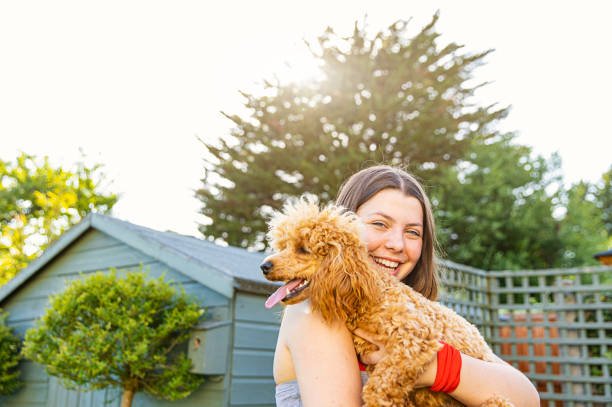
The Costs of Owning a Poodle
Owning a Poodle comes with its own set of expenses, and it’s important to be prepared for them. Here’s a breakdown of the costs associated with Poodle ownership:
1. Initial Cost
- The initial cost of purchasing a Poodle can vary widely depending on the size (Standard, Miniature, or Toy), pedigree, and breeder reputation. It can range from $1,000 to $3,000 or more.
2. Grooming Expenses
- Poodles have a unique coat that requires regular grooming. Professional grooming sessions can cost anywhere from $50 to $150 per visit, depending on the region and the complexity of the cut.
- Additionally, you’ll need grooming tools such as brushes, combs, and shampoos, which can amount to approximately $100 to $200 annually.
3. Veterinary Care
- Annual check-ups, vaccinations, and preventive medications are essential for your Poodle’s health. Veterinary expenses can range from $200 to $600 per year, depending on your location and the specific needs of your dog.
4. Food and Treats
- High-quality dog food is essential for your Poodle’s nutrition. Expect to spend approximately $40 to $100 per month on dog food, depending on the brand and your dog’s size.
- Treats and supplements can add an additional $10 to $30 per month.
5. Training and Socialization
- Enrolling your Poodle in obedience classes or hiring a professional dog trainer can range from $100 to $600, depending on the duration and type of training.
6. Toys and Accessories
- Toys, bedding, collars, leashes, and other accessories can add up to around $200 to $500 per year, depending on your preferences and your Poodle’s needs.
7. Pet Insurance
- Consider the cost of pet insurance, which can range from $30 to $60 per month, depending on the coverage you choose.
Pros and Cons of Having a Poodle as a Pet
Pros:
- Intelligence: Poodles are one of the smartest dog breeds, making them highly trainable and capable of learning a wide range of commands.
- Hypoallergenic: Their non-shedding, hypoallergenic coat makes them a great choice for individuals with allergies.
- Affectionate: Poodles are known for their affectionate nature and strong bonds with their owners.
- Adaptability: They are versatile dogs that can adapt to different living environments, from apartments to houses with yards.
- Playfulness: Poodles maintain their playful spirit well into adulthood, providing endless entertainment and joy.
Cons:
- Grooming: Their unique coat requires regular grooming, which can be time-consuming and costly.
- Exercise Needs: Poodles have high energy levels and require consistent exercise and mental stimulation.
- Separation Anxiety: They may develop separation anxiety if left alone for extended periods.
- Barking Tendencies: Poodles can be prone to excessive barking if not properly trained and socialized.
- Cost of Ownership: Poodle ownership comes with expenses, including grooming, veterinary care, and premium dog food.
In conclusion, owning a Poodle can be a rewarding experience, filled with love and companionship. While there are costs involved, both in terms of grooming and general care, the joys of having a Poodle as a pet often far outweigh the challenges. Their intelligence, affectionate nature, and adaptability make them wonderful additions to many households.
11. Breed-Specific Accessories and Care Products for Poodles
Poodles are a unique breed with specific grooming and care requirements. To ensure your Poodle is happy and healthy, it’s important to invest in the right accessories and care products. In this section, we’ll recommend specific items tailored to the needs of Poodles, including grooming tools, harnesses, toys, and more.
Grooming Tools
1. Slicker Brush: Poodles have a dense and curly coat that requires regular brushing to prevent matting. A slicker brush is designed to remove tangles and keep their coat in excellent condition.
2. Comb: A fine-toothed comb is useful for detangling smaller areas and ensuring that there are no knots in their fur, especially around the ears and tail.
3. Curved Scissors: Poodles often need precise trimming around their paws and face. Curved scissors make it easier to achieve a clean and even cut.
4. Clippers: Invest in high-quality clippers for Poodle grooming sessions. Cordless clippers are convenient for maneuvering around your dog without the hassle of cords.
5. Detangling Spray: A detangling spray can help loosen knots and make brushing more comfortable for your Poodle. Look for a spray with natural ingredients to avoid skin irritation.
6. Dog Hair Dryer: Poodles’ dense coats can take a while to dry, especially after a bath. A dog-specific hair dryer is designed to efficiently dry their fur without causing overheating.
Harnesses and Collars
1. No-Pull Harness: Poodles can be enthusiastic walkers, and a no-pull harness helps control their pulling behavior during walks without causing discomfort.
2. Harness with a Front Clip: Front-clip harnesses provide more control over your Poodle’s movements and can be particularly helpful during training sessions.
3. Adjustable Collar: Ensure your Poodle’s collar is adjustable for a snug yet comfortable fit. Consider a quick-release buckle for safety.
4. ID Tags: Personalized ID tags with your contact information are essential in case your Poodle ever gets lost. Make sure the tags are securely attached to their collar.
Toys and Mental Stimulation
1. Interactive Puzzle Toys: Poodles are highly intelligent and benefit from mental stimulation. Interactive puzzle toys challenge their problem-solving skills and keep them engaged.
2. Kong Classic Dog Toy: The Kong toy can be stuffed with treats or peanut butter, providing hours of entertainment and mental exercise for your Poodle.
3. Fetch Toys: Poodles enjoy a game of fetch. Invest in durable, non-toxic fetch toys that can withstand their enthusiastic play.
4. Chew Toys: Poodles love to chew, and providing them with safe and durable chew toys can help prevent them from chewing on furniture or shoes.
Bedding and Comfort
1. Orthopedic Dog Bed: Poodles are prone to joint issues, especially as they age. An orthopedic dog bed with memory foam can provide support and comfort for their joints.
2. Blankets and Covers: Protect your Poodle’s bed or favorite resting spot with washable blankets or covers. This makes cleaning up after any accidents or shedding easier.
3. Elevated Dog Bed: Elevated dog beds are ideal for keeping your Poodle cool and comfortable, especially in warm weather.
Grooming Products
1. Hypoallergenic Shampoo and Conditioner: Poodles have sensitive skin, so opt for hypoallergenic grooming products to avoid skin irritations.
2. Ear Cleaner: Poodles are prone to ear infections due to their floppy ears. Regularly clean their ears with a gentle, vet-recommended ear cleaner.
3. Dental Care Products: Maintain your Poodle’s dental health with dog-friendly toothpaste and a toothbrush designed for dogs. Dental chews are also beneficial.
4. Paw Balm: Protect your Poodle’s paws from rough terrain and harsh weather with a paw balm that moisturizes and soothes.
Training and Behavior Aids
1. Training Treats: High-quality training treats are essential for rewarding good behavior during training sessions. Look for treats that are small, soft, and tasty.
2. Clicker: Clicker training is effective for Poodles. Use a clicker to mark desired behaviors during training and reinforce positive actions.
3. Calming Aids: If your Poodle is prone to anxiety or nervousness, consider calming aids such as pheromone diffusers or anxiety wraps.
Travel Accessories
1. Car Seat or Seatbelt Harness: Safety first! Keep your Poodle secure during car rides with a car seat or seatbelt harness designed for dogs.
2. Travel Water Bottle: Stay hydrated on the go with a portable water bottle designed for dogs. It’s especially useful during hikes or long walks.
Health and Wellness
1. Supplements: Consult your veterinarian about any necessary supplements for your Poodle’s specific needs, such as joint supplements or omega-3 fatty acids.
2. Flea and Tick Prevention: Keep your Poodle protected from fleas and ticks with vet-recommended prevention products.
Remember that each Poodle is unique, and their specific needs may vary. Consult with your veterinarian or a professional groomer for personalized recommendations based on your Poodle’s size, age, and health. By investing in the right accessories and care products, you can ensure that your Poodle leads a happy and healthy life.
12. Frequently Asked Questions (FAQs) About Poodles
Poodles are beloved for their intelligence, charm, and unique appearance. However, owning a Poodle comes with specific considerations and questions. In this section, we’ll address 10 common questions about the Poodle breed, covering topics that may not have been covered in the main sections.
1. What Are the Different Poodle Sizes, and How Do They Differ?
Poodles come in three sizes: Standard, Miniature, and Toy. Standards are the largest, with a height of over 15 inches. Miniatures stand between 10 to 15 inches tall, while Toys are under 10 inches. Each size has its own unique characteristics and care requirements.
2. Do Poodles Shed?
Poodles are known for being hypoallergenic, which means they shed very little. Instead of shedding, their hair continues to grow like human hair. Regular grooming is necessary to prevent matting and keep their coat in good condition.
3. Are Poodles Good Family Dogs?
Yes, Poodles are excellent family dogs. They are intelligent, playful, and usually good with children. Their hypoallergenic coat is a bonus for families with allergies.
4. What Is the Typical Lifespan of a Poodle?
Poodles have a relatively long lifespan compared to other breeds. Standard Poodles typically live around 10 to 13 years, while Miniatures and Toys can live up to 15 years or more with proper care.
5. Are Poodles Prone to Specific Health Issues?
While Poodles are generally healthy dogs, they can be prone to certain health issues, including hip dysplasia, progressive retinal atrophy (PRA), and bloat. Regular vet check-ups can help catch and address these issues early.
6. Do Poodles Require Specialized Training?
Poodles are highly intelligent and respond well to positive reinforcement training. While they may require more mental stimulation than some breeds, they are not necessarily harder to train. Consistency and positive reinforcement are key.
7. Can Poodles Swim?
Many Poodles are excellent swimmers and enjoy water. Their webbed feet make them naturally adept at swimming. However, it’s essential to supervise them around water, especially if they are not familiar with it.
8. Are Poodles Good for People with Allergies?
Yes, Poodles are often a good choice for people with allergies. Their low-shedding coat produces fewer allergens than other breeds. However, individual allergies vary, so spending time with a Poodle before bringing one home is advisable.
9. How Much Exercise Do Poodles Need?
Poodles have moderate to high energy levels, and their exercise needs depend on their size and age. Standard Poodles require more exercise than Miniatures and Toys. Aim for at least 30 minutes to an hour of daily exercise, including playtime and walks.
10. What Should I Consider Before Getting a Poodle?
Before bringing a Poodle into your life, consider factors like grooming requirements, exercise needs, and your ability to provide mental stimulation. Ensure that you have the time and resources to care for a Poodle’s physical and emotional well-being.
Remember that each Poodle is unique, and their individual temperament and needs may vary. It’s essential to research and understand the breed thoroughly before bringing one into your home to ensure a happy and fulfilling companionship for both you and your Poodle.
13. Conclusion
In this comprehensive guide, we’ve delved deep into the world of Poodles, exploring their unique characteristics, care requirements, and everything you need to know about these charming and intelligent dogs. Let’s summarize the key points we’ve covered and emphasize the importance of responsible ownership while encouraging adoption.
Summarize Key Points
We began by introducing you to the Poodle breed, with its three distinct sizes: Standard, Miniature, and Toy. These dogs are renowned for their hypoallergenic, non-shedding coats, which require regular grooming to keep them healthy and beautiful. Poodles are not only intelligent but also affectionate and playful, making them excellent family pets.
In the sections that followed, we explored various aspects of Poodle ownership:
- Breed History and Origin: We learned about the breed’s history, from its European roots to its development as a popular show dog.
- Understanding the Poodle Breed’s Traits: We discussed their physical characteristics, temperament, and specific care needs. Poodles thrive in loving and stimulating environments, and training and socialization play crucial roles in their development.
- Health Considerations and Care: We highlighted potential health issues and provided guidance on maintaining your Poodle’s well-being through proper diet, exercise, grooming, and regular veterinary care.
- Choosing and Adopting a Poodle Dog Breed: We emphasized the benefits of adoption, shared tips for research and preparation, and discussed responsible breeding practices.
- Popularity and Recognition: We explored the breed’s current popularity and its recognition by kennel clubs and breed organizations. Additionally, we looked at distinct Poodle varieties.
- Exercise and Activity Recommendations: We offered a detailed exercise plan, nutrition guidelines, and tips for keeping your Poodle healthy and active.
- Socialization and Training Tips: We provided advice on training and socialization, taking into account their intelligence and temperament. We also discussed common behavioral traits and how to manage them effectively.
- Common Behavioral Traits: We addressed common behavioral traits of Poodles, both positive and challenging, offering guidance on managing and addressing specific issues.
- Personal Stories and Testimonials: We shared heartwarming stories and testimonials from Poodle owners, giving you a glimpse into the joys and challenges of Poodle ownership.
- Breed-Specific Accessories and Care Products: We recommended essential accessories and care products tailored to the Poodle breed’s unique needs, including grooming tools, harnesses, toys, and more.
- Frequently Asked Questions (FAQs): We answered 10 common questions about Poodles, addressing topics not covered in the main sections.
Responsible Ownership
Responsible pet ownership is at the core of ensuring a happy and healthy life for your Poodle. This includes providing proper care, nutrition, exercise, and socialization. Remember that Poodles thrive on companionship and mental stimulation, so dedicating time and attention to them is essential. Additionally, their hypoallergenic coat requires regular grooming to prevent matting and discomfort.
When it comes to training, positive reinforcement techniques are highly effective with Poodles due to their intelligence. Consistency and patience are key to successful training and a well-behaved Poodle.
Encourage Adoption
While there are reputable breeders who produce healthy and well-socialized Poodles, we encourage you to explore adoption options. Many Poodles in need of loving homes can be found in rescue organizations and shelters. By adopting, you’re not only giving a Poodle a second chance at a happy life but also supporting responsible pet ownership.
Consider visiting local animal shelters or breed-specific rescue organizations to find a Poodle that suits your lifestyle and preferences. Adoption not only provides a home for a dog in need but also brings immense joy and fulfillment to your life.
For more information on Poodle adoption and rescue organizations, you can visit websites like the Poodle Club of America Rescue Foundation or your local animal shelters.
In conclusion, Poodles are more than just a pretty face; they are loving, intelligent, and loyal companions. With the right care, training, and attention to their unique needs, you can enjoy a fulfilling and lasting bond with your Poodle. Whether you choose to adopt or purchase from a breeder, the love and joy they bring to your life are immeasurable.

















